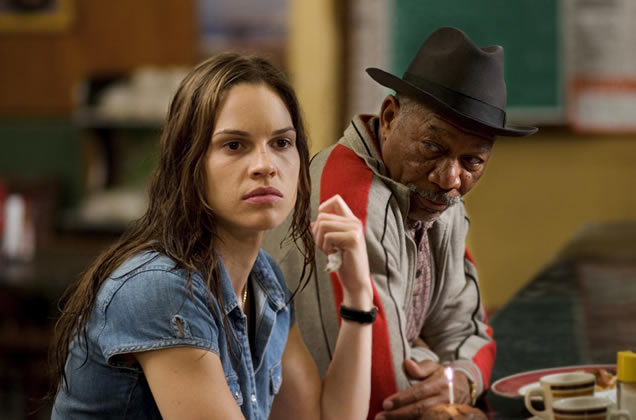Two-time Academy award winner, Hilary Swank, 40, stars in The Homesman, a western saga opposite Tommy Lee Jones and Meryl Streep.
Swank made her film debut in 1992 in Buffy the Vampire Slayer before her breakout role in The Karate Kid franchise. It was her role in Boys Don’t Cry which earned her a Best Actress award, at the Oscars in 1999. In 2004, she took home the honours again in the sports drama, Million Dollar Baby. Other notable movies include The Gift (2000), P.S. I Love You (2007), and Amelia (2009).
Her off-screen life is a rags-to-riches story. She was born in Nebraska; her mother was a secretary and a dancer, and her father, a Chief Master Sergeant in the Oregon Air National Guard who later became a travelling salesman. She also has a brother, eight years her senior. Due to financial woes, the family moved to a trailer park in Washington when she was six years old.
Her parents separated when she was fifteen, and she and her mother moved to Los Angeles where they lived out of their car until her mother had saved enough money to rent an apartment.
Romantically, Swank met and married Chad Lowe (brother of Rob), in 1997 after meeting him on the set of Quiet Days in Hollywood. They divorced in 2007. In 2006, she began dating her agent, John Campisi until the summer of 2012. She has since been in a relationship with French real estate broker, Laurent Fleury, with whom she lives part of the time in his apartment in Paris.
Together: You often portray strong women that have overcome immense adversity. Do you see a parallel to yourself at all? You came from quite a humble background.
Hilary Swank: Yeah, to be able to see the common thread between characters that I’ve played and my own life I can only say that it’s not that I search out those types of characters. It’s not like I call my agents and say, ‘Bring me the women who aren’t afraid to follow their dream!’ I think what happens is when the scripts come across my desk, there’s just either a fire that lights in my belly or there isn’t.
Did life change after two Oscar wins? Did that put more pressure on you?
You know, I think the interesting thing is, it’s almost the pressure you put on yourself. Not after Million Dollar Baby but after Boys Don’t Cry and you’re winning an Academy Award and you’re so young and you aren’t known for anything else really, except for that one film, you think, ‘Where do I go from here?’ You’re like all the way up here and you’ve gotten this incredible acknowledgment about your work, something that you never expected to happen. And so you put this enormous pressure on yourself and think, ‘I can’t mess up now.’ And of course, you’re going to make mistakes, you’re going to make a movie that doesn’t work and there is no such thing as perfection. I watch Boys Don’t Cry and Million Dollar Baby, and I see the flaws. I see where I could have been better. I have so much to learn and achieve and I don’t ever want to rest on my laurels and say, ‘Yeah, it’s easy from here.’ And a lot of people say, ‘Well, now you’ve done that, you can kind of just sit back.’ I’m like, ‘Sit back?’ (laughs)
You don’t seem to work that much – I imagine that’s by choice?
Usually I only like to do a movie a year mostly because it takes a few months to film a movie, and then the preparation for it is a few months, and so that is already almost half a year. Then you have to go and promote it and that’s a full time job.
Are you one for bringing the character home?
No, I’ve learned that it’s best to try to walk away from it, because first of all, a short day on a movie set is fourteen hours, and that’s really not the norm. It’s anywhere from fifteen to sixteen hours, sometimes eighteen hours a day, and so you’re practically living your character anyway because when you leave the set, you’re learning your lines for the next day and then going to sleep. So other than sleeping you’re never really only out of character, but if you’re trying to walk around in it like on the weekends and stuff, I just find you kind of lose your mind. (laughter) It might be why a lot of actors go crazy. I’m not kidding, you are in it, you’re in it so deeply and I think that it’s really what happens to a lot of actors.
It is an industry that showers you with all sorts of things, what do you do to keep yourself grounded?
I have great friends around me, my family, and I think that because of my background because of where I come from, because of how I grew up, it’s just not something I forget. It helps me to not take what I have now for granted. I really appreciate that I get to travel and that I see the world and that I can pay my bills. It’s an incredible feeling to say that I can actually buy that pair of shoes and get my groceries, and I don’t take that for granted; I don’t ever forget it, and I appreciate a sale as much as the next person. I really think about where I’m spending my money, and I like to spend my money on my family and I think just not forgetting where you come from.
When you first arrived in LA – what do you remember most about that time when you look back at it?
Well, at that moment, the thing is you only know that those things are not the norm when you’ve had life experience. For me, when people say, ‘Wow; you grew up in a trailer.’ But it didn’t feel like that. I didn’t feel, ‘Oh, poor me, I’m in a trailer park.’ It wasn’t a bad experience. I had a roof over my head and I had food, and so it wasn’t that being poor and having those experiences was a negative. The negative part of it was learning about class at such a young age, not from my friends, but from my friend’s parents, who would say, ‘You aren’t to hang out with her.’ At six years old, to have a parent say, ‘You’re not welcome in our home, you need to go.’ Or, ‘You can’t play with my son or daughter.’ Now I see children, I just think, ‘How could anyone do something like that?’ It really boggles your mind but I think that it’s really an insecurity. I think it’s a fear of the unknown. And it also taught me compassion. It’s hard to rise above when I see those people if I go home and they want to talk to me now because I’m famous and they want to have conversations, it’s hard for me to rise above it. But like I said, you just have to try and find compassion and to recognise that when people are different, it’s threatening to some people.
Do you think that upbringing has changed your response to the celebrity spotlight and media intrusion?
I don’t know; I think any sort of an intrusion is an intrusion. I find that people are very kind and supportive to me, even through some of my difficult times in my life; I mean just the nature of being an actor is that your private life is out on display. We are humans, we go through our own hard times and we make mistakes and we’re out there for everyone to see and everyone to comment on and say how they would do it differently. Sure, it’s easy to judge, it’s easy to point a finger at someone else and say, ‘Oh, I would do that so differently,’ but growing up now, I kind of feel like I grew up in the business. I’ve been doing it now for over half my life and it’s just one of the side effects of my job, is to be under that kind of constant scrutiny.
Has that had a bearing on where you feel you are at in your career now?
No, I feel like I’m really blessed. I feel like I get a lot of opportunities and my job brings me so much joy, and every time I’m on a movie set, I just kind of sit there in awe, and the kind of surprise and beauty of what I get to be a part of never ceases to amaze me.
Being an actress in Hollywood, has it been difficult to be taken seriously?
Well, if anything, I don’t think one of my problems is being taken seriously. (laughs) I think people think I’m really serious; I think one of my problems is people think I’m too serious. Just from the nature of my jobs, everyone says, ‘I thought when I was going to meet you, you’d be so intense’ (laughter) which makes sense to me because my movies are pretty intense, but sure, there are moments when I’ll read a movie and they’ll say, ‘We’re casting the guy first, and if the guy commands a lot of money, then we’ll cast the woman off of the budget, what’s left over for the girl.’ So they won’t even necessarily go after the actress that’s right for the role, they’ll go with whoever will work for the money.
And what’s your response to that, do you say, no, then I’m not doing that project then?
No, I would never say that, not if it’s something I really want to be part of. I mean I didn’t become an actor to make a certain amount of money, but it’s frustrating to think that it has to be cast that way, but I think it’s getting better.
How would you describe your style?
My friends and I joke that I have one foot in the meadow and one foot in the ghetto, (laughs). That probably sums it up.







